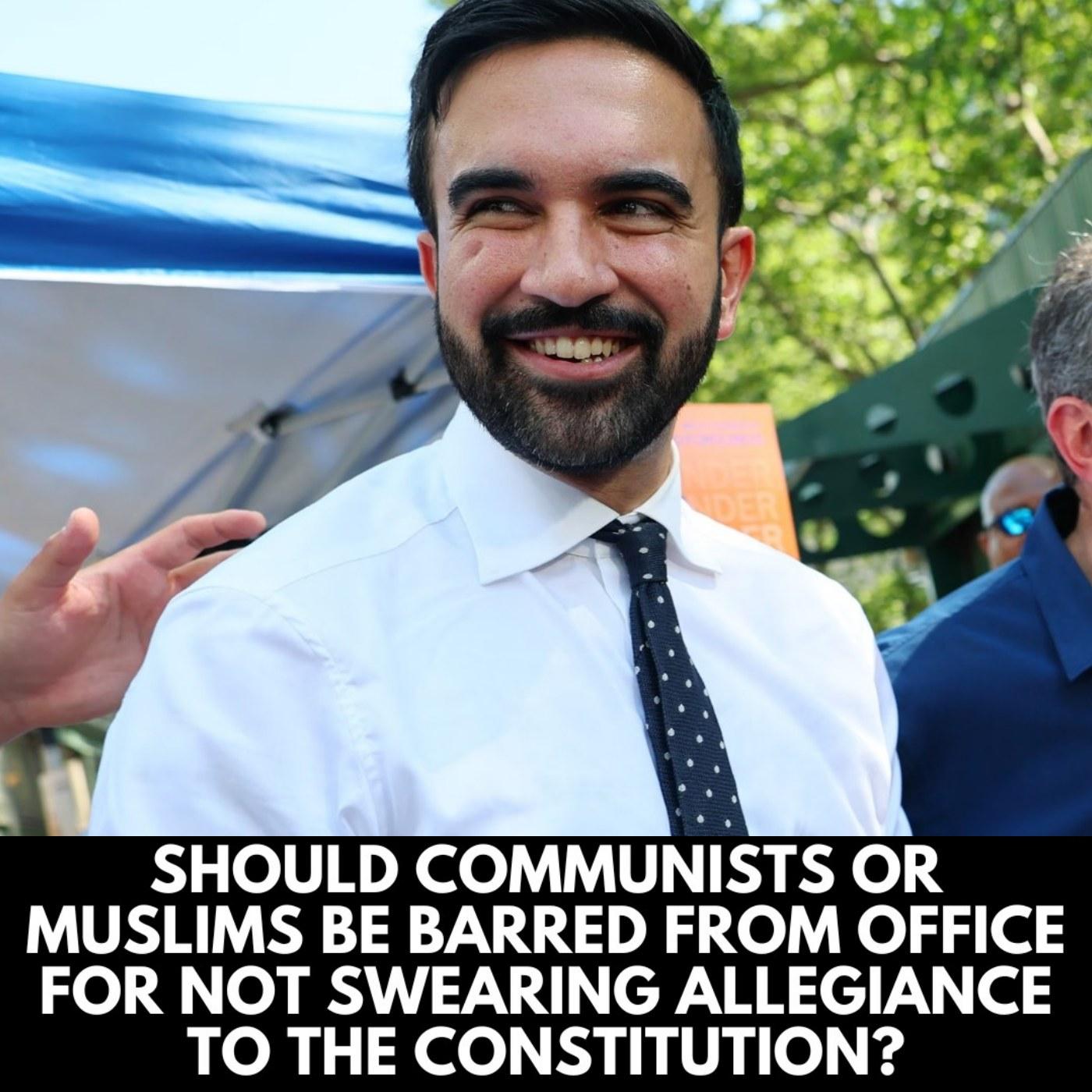
Should Allegiance to the Constitution Be a Requirement for Public Office Regardless of Religion or Ideology?
Introduction
The image above poses a highly provocative question: Should communists or Muslims be barred from office for not swearing allegiance to the Constitution? While it may stir strong opinions, it also opens the door to a deeper conversation about the values that underpin American democracy. At the heart of the issue lies the balance between freedom of belief and loyalty to the country’s foundational legal framework—the United States Constitution.
The Constitutional Oath Requirement
According to Article VI, Clause 3 of the U.S. Constitution, all public officials—federal and state—are required to take an oath or affirmation to support the Constitution. This clause ensures that those in public office affirm their loyalty to the guiding principles of American democracy, regardless of their personal background, faith, or political ideology.
However, this requirement is not about religion or political belief. In fact, the Constitution specifically prohibits any religious test as a qualification for public office:
“No religious Test shall ever be required as a Qualification to any Office or public Trust under the United States.”
This means that being Muslim—or of any other faith—cannot and should not disqualify someone from serving in public office, as long as they uphold the Constitution.
The Danger of Conflating Religion with Disloyalty
To suggest that Muslims or communists, by default, may not swear allegiance to the Constitution is a generalization that can dangerously edge toward religious and political discrimination. While some people may hold extreme views in any ideology or religion, it is not representative of the whole.
Muslim Americans have served honorably in public office, the military, and law enforcement. Figures like Rep. Ilhan Omar and Rep. André Carson have taken the constitutional oath while practicing their faith openly and actively participating in the democratic process.
Historical Parallels: The Red Scare and McCarthyism
In the mid-20th century, the United States experienced the Red Scare, a period of intense fear over the spread of communism. During this time, many individuals were accused, blacklisted, or prosecuted for alleged communist sympathies, often without due process. Senator Joseph McCarthy’s infamous hearings led to reputational destruction and civil rights violations.
These moments in American history serve as reminders of how quickly fear can override constitutional rights. Suppressing political belief—even unpopular or radical ones—runs counter to the First Amendment, which protects free speech and freedom of thought.
Swearing Allegiance and the Role of Personal Belief
Taking an oath to the Constitution does not require a person to abandon their faith or ideological beliefs. Rather, it is a promise to uphold a legal and democratic system that allows for pluralism and freedom of conscience. The oath does not demand religious uniformity or loyalty to a specific party or leader—it demands loyalty to a system of laws.
In fact, elected officials from diverse ideological backgrounds—liberal, conservative, socialist, libertarian—have taken the same oath and served within the framework of American democracy.
When Belief Conflicts with Duty
It is legitimate to ask: what happens when an elected official’s beliefs directly contradict constitutional values? For instance, if a candidate refuses to uphold the rights of others or advocates for the overthrow of the government by force, that may be grounds for disqualification.
But these concerns must be addressed on a case-by-case basis, through legal procedures, rather than blanket bans based on group identity. The legal system already provides safeguards for dealing with threats to national security and the rule of law.
Religious Freedom Is a Foundational Principle
The United States was founded on the principle of religious freedom. Many early settlers fled persecution in their homelands to practice their faith freely in America. The First Amendment guarantees this right, ensuring that government cannot favor or discriminate against any religion.
Barring Muslims—or adherents of any faith—from office would be a direct violation of this fundamental freedom. It would also alienate millions of patriotic Americans who seek to serve their country with integrity.
Public Discourse and Responsibility
While the image prompts a provocative question, it also illustrates the importance of responsible public discourse. Conversations about national security, loyalty, and public trust are important—but they must be approached with respect for the law, constitutional rights, and human dignity.
Questions that suggest exclusion based on religion or ideology can inflame division, spread misinformation, and erode public trust in democratic institutions.
A Better Way Forward
Rather than questioning someone’s fitness for office based on their faith or political beliefs, we should ask:
-
Do they uphold democratic values?
-
Do they support the Constitution?
-
Do they work for the good of all Americans?
By focusing on actions and commitment to the rule of law, rather than identity, we can preserve the strength and integrity of American democracy.
Conclusion
To bar individuals from holding public office solely based on being Muslim or holding certain political views would violate the core values of freedom and equality that the United States claims to stand for. While allegiance to the Constitution is non-negotiable for public service, it must not be used as a tool to justify religious discrimination or ideological exclusion.
Instead, let us judge all candidates on their merits, their integrity, and their willingness to serve the people within the bounds of the Constitution. That is the true test of patriotism in a free and open society.






